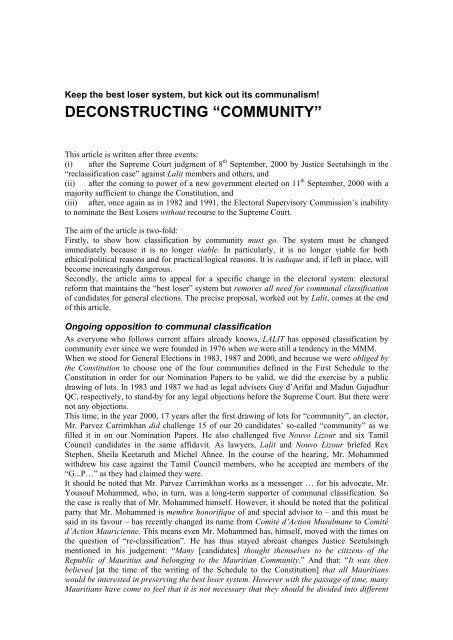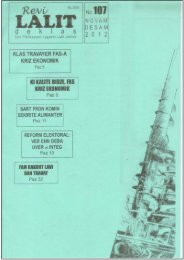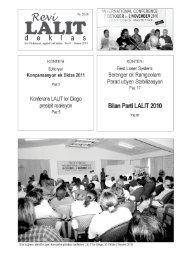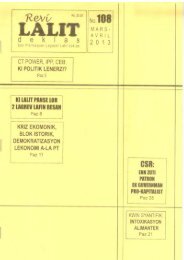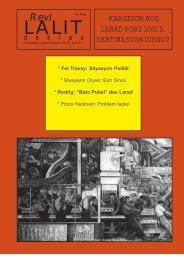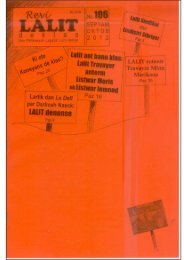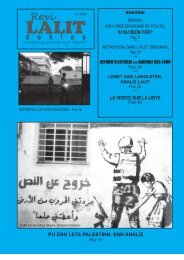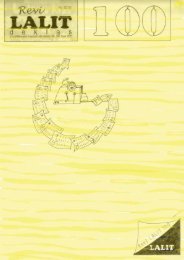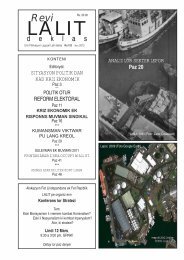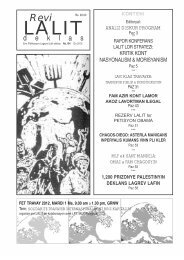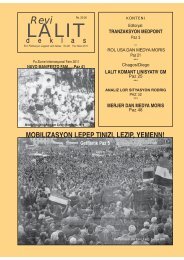Against communalism of the best-loser system - Lalit Mauritius
Against communalism of the best-loser system - Lalit Mauritius
Against communalism of the best-loser system - Lalit Mauritius
Create successful ePaper yourself
Turn your PDF publications into a flip-book with our unique Google optimized e-Paper software.
Keep <strong>the</strong> <strong>best</strong> <strong>loser</strong> <strong>system</strong>, but kick out its <strong>communalism</strong>!<br />
DECONSTRUCTING “COMMUNITY”<br />
This article is written after three events:<br />
(i) after <strong>the</strong> Supreme Court judgment <strong>of</strong> 8 th September, 2000 by Justice Seetulsingh in <strong>the</strong><br />
“reclassification case” against <strong>Lalit</strong> members and o<strong>the</strong>rs, and<br />
(ii) after <strong>the</strong> coming to power <strong>of</strong> a new government elected on 11 th September, 2000 with a<br />
majority sufficient to change <strong>the</strong> Constitution, and<br />
(iii) after, once again as in 1982 and 1991, <strong>the</strong> Electoral Supervisory Commission’s inability<br />
to nominate <strong>the</strong> Best Losers without recourse to <strong>the</strong> Supreme Court.<br />
The aim <strong>of</strong> <strong>the</strong> article is two-fold:<br />
Firstly, to show how classification by community must go. The <strong>system</strong> must be changed<br />
immediately because it is no longer viable. In particularly, it is no longer viable for both<br />
ethical/political reasons and for practical/logical reasons. It is caduque and, if left in place, will<br />
become increasingly dangerous.<br />
Secondly, <strong>the</strong> article aims to appeal for a specific change in <strong>the</strong> electoral <strong>system</strong>: electoral<br />
reform that maintains <strong>the</strong> “<strong>best</strong> <strong>loser</strong>” <strong>system</strong> but removes all need for communal classification<br />
<strong>of</strong> candidates for general elections. The precise proposal, worked out by <strong>Lalit</strong>, comes at <strong>the</strong> end<br />
<strong>of</strong> this article.<br />
Ongoing opposition to communal classification<br />
As everyone who follows current affairs already knows, LALIT has opposed classification by<br />
community ever since we were founded in 1976 when we were still a tendency in <strong>the</strong> MMM.<br />
When we stood for General Elections in 1983, 1987 and 2000, and because we were obliged by<br />
<strong>the</strong> Constitution to choose one <strong>of</strong> <strong>the</strong> four communities defined in <strong>the</strong> First Schedule to <strong>the</strong><br />
Constitution in order for our Nomination Papers to be valid, we did <strong>the</strong> exercise by a public<br />
drawing <strong>of</strong> lots. In 1983 and 1987 we had as legal advisers Guy d’Arifat and Madun Gujudhur<br />
QC, respectively, to stand-by for any legal objections before <strong>the</strong> Supreme Court. But <strong>the</strong>re were<br />
not any objections.<br />
This time, in <strong>the</strong> year 2000, 17 years after <strong>the</strong> first drawing <strong>of</strong> lots for “community”, an elector,<br />
Mr. Parvez Carrimkhan did challenge 15 <strong>of</strong> our 20 candidates’ so-called “community” as we<br />
filled it in on our Nomination Papers. He also challenged five Nouvo Lizour and six Tamil<br />
Council candidates in <strong>the</strong> same affidavit. As lawyers, <strong>Lalit</strong> and Nouvo Lizour briefed Rex<br />
Stephen, Sheila Keetaruth and Michel Ahnee. In <strong>the</strong> course <strong>of</strong> <strong>the</strong> hearing, Mr. Mohammed<br />
withdrew his case against <strong>the</strong> Tamil Council members, who he accepted are members <strong>of</strong> <strong>the</strong><br />
“G...P…” as <strong>the</strong>y had claimed <strong>the</strong>y were.<br />
It should be noted that Mr. Parvez Carrimkhan works as a messenger … for his advocate, Mr.<br />
Yousouf Mohammed, who, in turn, was a long-term supporter <strong>of</strong> communal classification. So<br />
<strong>the</strong> case is really that <strong>of</strong> Mr. Mohammed himself. However, it should be noted that <strong>the</strong> political<br />
party that Mr. Mohammed is membre honorifique <strong>of</strong> and special advisor to – and this must be<br />
said in its favour – has recently changed its name from Comité d’Action Musulmane to Comité<br />
d’Action Mauricienne. This means even Mr. Mohammed has, himself, moved with <strong>the</strong> times on<br />
<strong>the</strong> question <strong>of</strong> “re-classification”. He has thus stayed abreast changes Justice Seetulsingh<br />
mentioned in his judgement: “Many [candidates] thought <strong>the</strong>mselves to be citizens <strong>of</strong> <strong>the</strong><br />
Republic <strong>of</strong> <strong>Mauritius</strong> and belonging to <strong>the</strong> Mauritian Community.” And that: “It was <strong>the</strong>n<br />
believed [at <strong>the</strong> time <strong>of</strong> <strong>the</strong> writing <strong>of</strong> <strong>the</strong> Schedule to <strong>the</strong> Constitution] that all Mauritians<br />
would be interested in preserving <strong>the</strong> <strong>best</strong> <strong>loser</strong> <strong>system</strong>. However with <strong>the</strong> passage <strong>of</strong> time, many<br />
Mauritians have come to feel that it is not necessary that <strong>the</strong>y should be divided into different


